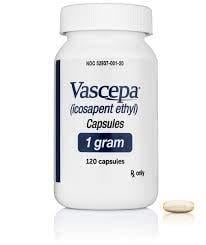
March 15, 2022 – Amarin has announced the publication of new REDUCE-IT data analysis that helps support the clinical benefits of icosapent ethyl (IPE) for patients who have received a percutaneous coronary intervention (PCI) and are at high risk for experiencing a stroke, heart attack, or fatal cardiovascular (CV) event.1
Percutaneous coronary interventions (also known as coronary angioplasty, which can include stent insertion) are medical procedures used to open coronary arteries, the main blood vessels supplying the heart, that are narrowed or blocked by a build-up of atherosclerotic plaque.2 The heart needs a constant supply of oxygenated blood to function effectively; if the coronary arteries become narrowed and restricted, this can lead to serious heart health complications such as angina or a heart attack.3
The REDUCE-IT Prior PCI study was a post hoc sub-analysis published in the Journal of the American Heart Association (JAHA). This publication furthers the clinical evidence base for icosapent ethyl treatment in patients with prior PCI at risk of a recurrent CV event.
There were 3,408 patients who had undergone a prior PCI (41.7% of the initial REDUCE-IT study population). The median time after PCI for these patients was 2.9 years. Baseline characteristics were similar among patients randomised to icosapent ethyl versus placebo. Of those patients with prior PCI included in the sub-analysis receiving standard of care treatment only, 37.6% experienced a major CV event (cardiovascular death, myocardial infarction, stroke, coronary revascularization, or unstable angina requiring hospitalization), compared with 25.6% of patients receiving icosapent ethyl.1
In patients with a history of PCI, icosapent ethyl treatment versus placebo reduced the first primary composite endpoint of CV death, non-fatal myocardial infarction (MI) (heart attack), non-fatal stroke, coronary revascularization, or unstable angina, by 34% (absolute risk reduction of 8.5%, HR 0.66; 95% CI, 0.58-0.76; p<0.001); number needed to treat (NNT) =12) and the total events (first and subsequent) by 39% (RR 0.61; 95% CI, 0.52-0.72; p<0.001).1
Icosapent ethyl also led to a 34% reduction in the key secondary composite endpoint of CV death, non-fatal MI, or non-fatal stroke versus placebo (absolute risk reduction 5.4%, HR 0.66; 95% CI, 0.56-0.79, p<0.001; NNT=19). The sub-analysis also showed that icosapent ethyl treatment led to a 40% risk reduction of repeat coronary revascularization versus placebo (absolute risk reduction 7.7%, HR 0.60; 95% CI, 0.51-0.70; p<0.001) in patients who have previously undergone PCI.1
Safety findings in the REDUCE-IT Prior PCI subgroup were consistent with the full study cohort.1
The REDUCE-IT study enrolled 8,179 patients for a median of 4.9 years, who were all receiving a stable dose of a statin for at least 4 weeks. All patients had controlled low-density lipoprotein cholesterol (LDL-C), elevated triglyceride levels, and were either 45 years of age or older, with established cardiovascular disease (CVD), or were 50 years of age or older, with diabetes and other cardiovascular risk factors.4
It is important to note that the exploratory nature limited this post hoc analysis. Other limitations noted by the authors include that REDUCE-IT was not powered for sub-group analyses and all P values should be considered hypothesis-generating.
Commenting on the paper’s findings, Dr Deepak L. Bhatt, M.D., M.P.H., Executive Director of Interventional Cardiovascular Programs at Brigham and Women’s Hospital and Professor of Medicine at Harvard Medical School, principal investigator of REDUCE-IT and senior author of the REDUCE-IT Prior PCI analyses, said:
“This analysis from REDUCE-IT highlights the benefits of icosapent ethyl in patients with elevated triglycerides and a history of prior PCI, a commonly performed procedure. The findings of benefit in at-risk patients with prior PCI are consistent with previously published coronary revascularization data demonstrating reductions in first and total coronary revascularization events of 34% and 36%, respectively, in the overall REDUCE-IT population. “5
Dr. Bhatt continued, “Patients on standard of care treatment who nevertheless have elevated triglycerides are at high-risk for recurrent CV events. Icosapent ethyl has the potential to benefit a large proportion of these patients, including those with a history of prior PCI."1
There is evidence suggesting that patients who have a prior PCI are at a heightened risk of subsequent CV events compared with other patients with CV risk factors.1 In recent years, efforts to improve stent design, LDL-C, inflammation, and platelet activity have reduced repeat events among patients who undergo coronary stenting.1
Yet, many patients still experience recurrent events, especially those with diabetes mellitus and elevated triglycerides.1 This suggests there may be a need for additional treatments and interventions to reduce this remaining risk.
Karim Mikhail, Amarin's president and chief executive officer, commented, “We continue to gain new insights into the important role that IPE can play in helping patients with CVD; especially for those most vulnerable to a serious or fatal event. This latest analysis showed that IPE lowered the risk of heart attack, stroke or cardiovascular death for patients with a prior PCI -- offering additional evidence that our product can be a vital contributor in reducing harm and deaths from cardiovascular disease around the world.”
The REDUCE-IT PCI subgroup analysis was funded by Amarin. Dr. Bhatt receives research funding from Amarin that goes to Brigham and Women’s Hospital.
References
1. Peterson BE, Bhatt DL, Steg PG, et al. Treatment with Icosapent Ethyl to Reduce Ischemic Events in Patients with Prior Percutaneous Coronary Intervention - Insights from REDUCE-IT PCI. Originally published 9 Mar 2022 https://doi.org/10.1161/JAHA.121.022937, J Am Heart Assoc. 2022;0:e022937
2. https://www.nhlbi.nih.gov/health-topics/percutaneous-coronary-intervention
3. NHS UK. Coronary angioplasty and stent insertion https://www.nhs.uk/conditions/coronary-angioplasty/ Accessed March 2022.
4. Bhatt DL, Steg PG, Miller M, et al. Cardiovascular Risk Reduction with Icosapent Ethyl for Hypertriglyceridemia. N Engl J Med. 2019;380(1):11-22.
5. Peterson BE, Bhatt DL, Steg PG, et al. Reduction in Revascularization With Icosapent Ethyl: Insights From REDUCE-IT Revascularization Analyses. Circulation. 2021;143(1):33-44.


 February 03, 2026
February 03, 2026 









